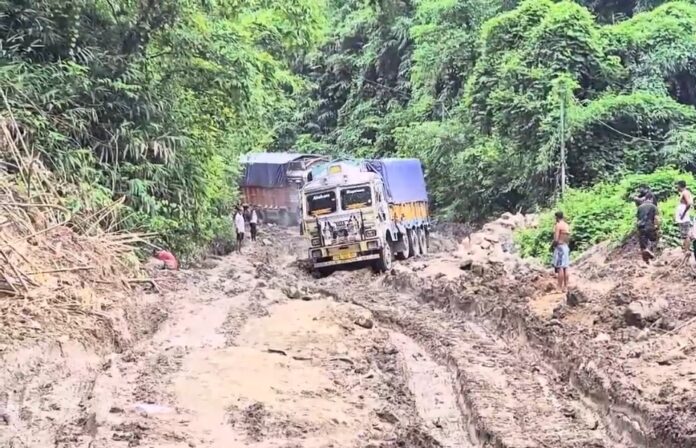Mizoram, a state in India’s northeastern region, is currently grappling with a severe shortage of fuel and essential goods, primarily attributed to the deteriorating condition of its road networks. The ongoing crisis has caused widespread inconvenience to residents, as fuel stations run dry, and the availability of daily necessities continues to dwindle. This issue is raising concerns about the state’s connectivity and its impact on the region’s economy and livelihoods.
The Road Infrastructure Crisis
Mizoram’s road infrastructure plays a crucial role in the supply chain for fuel and essential goods. The state relies heavily on road transport for the movement of goods, especially as its hilly terrain makes other modes of transportation less feasible. However, many of the state’s key roads are in a dilapidated state, hampering the smooth movement of trucks and tankers carrying essential supplies like fuel, food, and other daily necessities.
The Aizawl-Silchar road, which serves as the lifeline of Mizoram, has been especially affected by landslides, wear and tear, and insufficient maintenance. This critical route connects Mizoram to the rest of the country, and any disruption in its usability significantly impacts the state’s economy. With this major road network currently suffering from blockages and damages, fuel tankers and trucks loaded with supplies have either been delayed or stranded, leading to shortages.
Fuel Shortages Hit the State
Fuel shortages in Mizoram have reached critical levels, forcing several fuel stations to shut down due to the lack of supply. Long queues have become a common sight in front of the remaining operational stations, as residents and commercial vehicles scramble to secure fuel. The scarcity has led to rising fuel prices in the black market, further exacerbating the situation for ordinary citizens.
The fuel crisis is not only affecting personal transportation but also impacting public services such as buses and taxis, which are essential for commuting in Mizoram’s hilly regions. The shortage of fuel has also started affecting emergency services, adding another layer of concern for the state’s residents.
Essential Goods Scarcity
The deteriorating road conditions have also caused a scarcity of essential goods in Mizoram, leading to inflated prices for food and other daily necessities. Many retailers are reporting a shortage of vegetables, rice, and other staples due to the disruption in supply chains. Goods that do manage to reach the state are arriving at a slower pace, forcing retailers to limit sales and causing prices to spike.
As the availability of these goods decreases, vulnerable populations, including low-income families, are facing the most significant impact. The inability to access affordable food and essential supplies is increasing pressure on local communities, leading to widespread frustration and unrest.
The Mizoram government has acknowledged the ongoing crisis and has appealed to the central government for assistance. In response, efforts have been made to repair and restore damaged road networks, with teams deployed to work on the Aizawl-Silchar route and other key roads in the state. However, the repair work is being hampered by adverse weather conditions and landslides, which continue to pose a challenge to the timely restoration of the road network.
Authorities are also coordinating with fuel companies and the central government to expedite fuel shipments to the state. Plans are in place to reroute some of the supplies through alternative routes, though these are less efficient and can take more time to deliver the necessary goods.
Impact on the Economy
The fuel and essential goods shortage is also affecting Mizoram’s economy, as businesses struggle to operate without a consistent supply of fuel and materials. Industries that rely on transport, such as construction and retail, are facing severe delays and increased operational costs, leading to job losses and reduced economic activity.
Agriculture, which is a significant sector in Mizoram, has also been impacted. Farmers are finding it increasingly difficult to transport their produce to markets, leading to a loss of income and a surplus of unsold crops. The tourism industry, another vital economic contributor, is also feeling the strain, as transportation issues discourage visitors from traveling to the region.
Experts suggest that long-term solutions to prevent such crises in the future must focus on improving the state’s infrastructure. Mizoram’s strategic location as a border state connecting India to Southeast Asia makes it imperative to invest in robust road networks and alternative transport routes. Additionally, developing more reliable air and rail links to the state can reduce its reliance on road transport for critical supplies.
The government must also consider setting up buffer stocks of essential goods and fuel to ensure that any disruption in road networks does not immediately lead to a crisis. Creating storage facilities for essential goods in the state’s more remote areas would ensure a steady supply even during road closures.




